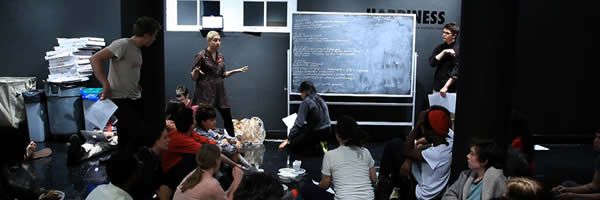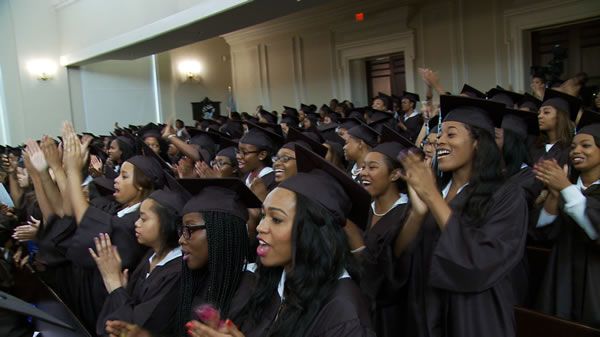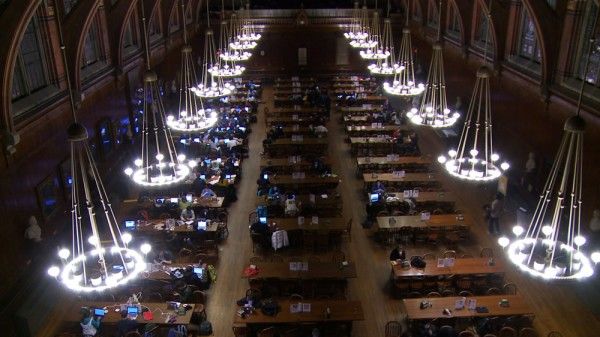After they leave higher education, young people are told they’ll be entering the “real world”, i.e. an unstructured environment where they’ll have to be self-sufficient. They’ll also be entering an absolutely insane place where among the myriad of problems they’ll likely face is that the entry cost to the real world has put them in tens of thousands of dollars of debt. The wretched economy has put them at an even greater disadvantage to where we’ve reached a crisis. Andrew Rossi’s documentary Ivory Tower examines this crisis from multiple perspectives, breaking down the problem, asking about the necessity of college, and potential alternatives or compromises. The documentary could use a better organization, and yet it’s never wishy-washy. At the very least, Rossi starts a conversation we need to be having.
Ivory Tower looks at the college crisis from multiple perspectives. The picture spends the first half moving back and forth between explaining the crisis, showing some of the benefits and drawbacks higher education. The movie then transitions from its shocking factoids to possible alternatives to the status quo. But even these alternatives have issues, and its clear that there’s no easy answer to this inescapable and devastating problem.
Although the picture can seem like a jumble, it’s clear that Rossi is trying to present a balanced perspective, although he goes to the extremes to do so. He opens with Harvard (even throwing a bit of The Social Network score for flavor) as the exemplar of higher education, moves to Arizona State University as a party school, takes us to the essential Spelman College (a prestigious liberal arts college for black women), and Cooper Union, which is under threat of charging tuition after being free since 1859. Cooper Union becomes a recurring storyline as the students fight back against the tide that has ruined lives for so many young people.
Rossi fills his films with shocking facts, and I was scribbling them down throughout the picture. For example, I didn’t know that lower state funding has increased the cost of tuition, that the cost of tuition has risen 1120% since 1980, and that ASU has luxury apartments for some of its students, which may be the most insane of these three facts. The quest for prestige, the exorbitant salaries for university presidents, new facilities, and other poor spending choices have jacked the price of tuition, although Rossi is slightly misleading in lumping in athletic facilities. That comes from sports revenue and not paying players, which is a completely different (albeit still terrible) system. But the larger point remains: tuition is overly expensive and it doesn’t have to be.
College aren’t solely responsible for this situation, and the picture is hesitant to lay some of the blame on parents and students who feel that they need the prestige in order to get a leg-up in the job market. However, half of students who graduated during the economic crisis are either unemployed or under-employed. Are the ones who get employed from the Ivy Leagues, and does it matter outside of these schools? Rossi does touch on the question of whether or not college is truly necessary, and although that does lead to the exploration of alternative models, it also ignores why businesses no longer acknowledge diplomas or whether or not a higher education is only better if it has a practical application. There’s plenty of attention paid to Harvard’s intro to computer science course, CS50, but neglects liberal arts that provide learning for the sake of enriching the mind. Yes, there’s no philosophy factory, but is higher learning nothing more than a high-end technical school?
This emphasis on technology carries over to the possible solutions, and Rossi admirably shows the double-edged sword of programs like Uncollege, MOOC, edX, and other alternatives. However, all of these have an emphasis on going into the technological field, and not everyone wants to learn in code, work in Silicon Valley, and/or found their own business. Instead, the picture points out that these programs haven’t been particularly successful, and at the very least are still going through growing pains. Nevertheless, I’m glad Rossi chose to at least take the time on these alternatives rather than laying out the current crisis and then speeding through how we might reverse this unsustainable situation. There are no easy solutions.
While the film doesn’t need to end with “And this is what needs to happen,” it still could make its points more forcefully if the argument was better organized. Cooper Union is an interesting story, but the film never makes a smooth transition when it returns to this plotline. Additionally, Rossi will attempt to provide a counterargument, but the way he begins his argument at first always seems like a tangent, and it’s not until he reaches his point that we realize what he was doing.
By covering this vast issue from various angles, Ivory Tower almost seems ambivalent about the college crisis, but it’s never cold or emotionless. When we see a young person who is being gouged by interest on her student loans, or when we’re shown a stunning infographic on the rise in costs, our gut reaction is shock and anger. While there is the “We’ll have to leave it there,” conclusion, Ivory Tower at least provides fairly in-depth information, and if we’re going to have a conversation about the college crisis, we first need to be well informed and passionate about it.
Rating: B
Click here for all of our Sundance 2014 coverage, and click on the corresponding links for my reviews:
And click on the corresponding links for Adam’s reviews:



